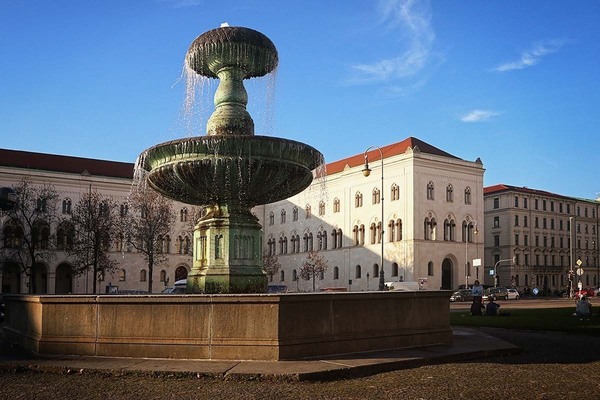
On February 13, 2024, a symposium jointly organized and co-sponsored by Ukrainian Catholic University, the Nanovic Institute for European Studies, and Ludwig Maximilian University met in Munich, Germany, to consider "Challenges of Russia’s War against Ukraine and the Ethical Principles of Sustainable Peace."
This symposium was held in advance of the Munich Security Conference, the world's leading forum for debating international security policy. As such, symposium participants authored and cosigned the below statement to the conference:
“Advancing the Ethical Dimension of European Security
“The Russian war against Ukraine poignantly illustrates that the unassessed, uncondemned, and unimpeded evil of the communist ideology and crimes of the Soviet regime inevitably erupt into wars and suffering of people and nations. Our future security is inherently fragile if we disregard these moral realities and attempt to isolate them from our security considerations, decisions, and strategies. We are also confronted with the reality of religious power narratives and the need to consider the religious and spiritual aspects of our security infrastructure.
“Drawing from the lessons of 1945, we are reminded that a military victory does not automatically ensure peace and human development. The only partial success – as is evidenced by the present-day tragic events – of the post-World War II international infrastructure and development of Western Europe was contingent upon the mental, moral, and military defeat of Nazi Germany and the Nuremberg conviction of Nazi ideology. The end of the Cold War did not bring “the end of history” – as some commentators thought – but merely signaled a truce followed by a series of wars geared to the restoring of a Russian empire (Moldova, Georgia, Ukraine).
“Democratic societies are stakeholders, not merely consumers, of security. Security starts with accepting dignity and human rights as fundamental societal principles, and with a willingness to make sacrifices to uphold this choice. Our vision of future security is incomplete without a conscientious acknowledgment of past moral realities and responsible navigation through the present moral landscape. Any security architecture is unsustainable unless built upon a solid ethical infrastructure, embraced by a resilient, morally sound, and justice-bound public culture. Our future security structure must internalize/appropriate this ethical foundation and thrive in a proper moral climate to prevent corrosion, failures, or eventual collapse.
“Therefore, the participants of the symposium call upon the upcoming Munich Security Conference 2024 to:
-
- Recognize Russia’s ongoing re-imperialization effort as the most serious present threat to Europe and global democracies requiring a collective response from European countries and allies.
- Confirm all needed support for Ukraine to reestablish sovereignty over its internationally recognized territory and provide necessary military, political, and financial assistance to help Ukraine repel the aggression of the Russian Federation.
- Acknowledge Ukraine’s sovereign right to pursue NATO membership and endorse its integration into the alliance.
- Recognize that security is based on the “power of law,” while insecurity arises from the “law of power.” Without countering and incapacitating Russia’s “law of power” strategy and recommitting globally to authentic law, lasting security and peace will remain elusive.
- Acknowledge that efforts to democratize Russia through trade and finance alone disregarding human rights and dignity-based public culture transformations have backfired. Without respect for civic values and virtues, “business as usual” is used as a hybrid weapon enabling the Kremlin’s international aggression.
- Mitigate the harm of unprincipled “business as usual,” by automatically triggering sanctions and assistance for countries subjected to aggression under the UN Summit 2005 framework. International sanctions must be enhanced to effectively trace perpetrators and prevent evasion of responsibility.
- Develop efficient mechanisms of counteracting Russia’s “nothing is true and everything is possible” media and information strategy as part of its hybrid warfare toolkit to foster public mobilization, counteract hostile narratives, affirm shared values, and fortify resolve against Russian aggression.
- Acknowledge that just peace relies on the explicit and early naming of violence and human rights violations. Therefore, the international legal system should be enhanced to more effectively investigate and prosecute Russian leadership and soldiers for war crimes, crimes against humanity, and atrocities against Ukraine and the Ukrainian people.
Markus Vogt, Ludwig Maximilian University (Munich, Germany)
Oleh Turiy, Ukrainian Catholic University (Lviv, Ukraine)
Clemens Sedmak, University of Notre Dame (South Bend, USA)
Volodymyr Turchynovskyy, Ukrainian Catholic University (Lviv, Ukraine)
Zeljko Tanjic, Catholic University of Croatia (Zagreb, Croatia)
Myroslav Marynovych, Ukrainian Catholic University (Lviv, Ukraine)
Mary Ellen O’Connell, University of Notre Dame (South Bend, USA)
Jan Tombinski, EU Ambassador to Ukraine (2012–2016) (Poland)
Robert Brinkley, British Ambassador to Ukraine (2002-2006) (United Kingdom)
Martin Schulze Wessel, Ludwig Maximilian University (Munich, Germany)
Marek Misak, COMECE (Brussel, Belgim)
Antoine Arjakovsky, Collège des Bernardins (Paris, France)
Andriy Mykhaleyko, Catholic University of Eichstätt-Ingolstadt (
Taras Dobko, Ukrainian Catholic University (Lviv, Ukraine)
Valeria Korablyova, Charles University (Prague, Czech Republic)
Christian Walter, Ludwig Maximilian University (Munich, Germany)
Iryna Fenno, Ukrainian Catholic University / Ludwig Maximilian University (Ukraine/Germany)
Yuriy Shchurko, Ukrainian Catholic University (Lviv, Ukraine)
Andriy Kostiuk, Ukrainian Catholic University (Lviv, Ukraine)
Oksana Kulakovska, Ukrainian Catholic University (Lviv, Ukraine)
Svitlana Khyliuk, Ukrainian Catholic University (Lviv, Ukraine)
Greg Lewicki, International Society for the Comparative Study of Civilizations (Gdansk, Poland)
Mariana Bujeryn, Harvard Kennedy School’s Belfer Center (Boston, USA)
Gelinada Grinchenko, University of Wuppertal / Kharkiv National University (Germany/Ukraine)
Aloys Buch, Supra-diocesan Seminary (Lantershofen, Germany)
Markus Patenge, German Commission for Justice and Peace (Berlin, Germany)
Oksana Mikheieva, Ukrainian Catholic University (Lviv), Centre for East European and International Studies (Berlin) (Ukraine/Germany)
Katrin Boeckh, Institute of East and Southeast European Studies (Regensburg, Germany)”
The text of this statement originally appeared on the Ukrainian Catholic University's website. It is presented unaltered here.